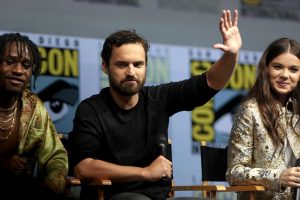If you’re anything like me, then the idea of seeing “Spider-Man: Into the Spider-Verse” only began to have some appeal after learning that John Mulaney played a part as “Peter Porker.” Of all Marvel characters, Spider-Man has probably been the one most beaten like a dead horse. Between the Toby Maguire films of the early 2000s, the brief revival with Andrew Garfield and the final victories of Tom Holland, this film didn’t seem necessary. I was wrong.

“Spider-Verse” should not work as a movie. The conceptually messy premise does not sound promising. To pull off a children’s feature about multiple dimensions, the plot would need to be clear and cohesive without spoon-fed explanations bogging down the script. The writers pull this off by having the story develop quickly, with many clever artistic moves to guide the viewer. Actually, the movie works in part by dipping into its comic book origins. The creators break the fourth wall by representing the characters’ other dimensional stories as comic books. The animation, too, plays into these traditional styles, not shying away from expressive lines or dotted shading. Compactly conveying a lot of information, multiple panels are often used in single scenes. After being bitten, the main character, Miles Morales (Shameik Moore), becomes surrounded by comic book thought boxes and he wonders why his voice is so loud. His new super traits help establish the comic book setting.

But it’s the main character himself and the dynamic that he has with the other characters that makes this movie. Moore has the original Spider-Man’s endearing, teenage awkwardness but stands firm as his own character. His own artistic and rebellious nature gives this movie vitality. It’s also refreshing to have a young, black superhero for kids to look up to — honestly, I look up to him, too. Alongside Jake Johnson as Peter Parker and Hailee Steinfeld as Gwen Stacy, the characters collide and click, making the movie equal parts tender and hilarious. Without spoiling anything, this movie is packed with great moments, and every scene feels fresh and original. Also, aside from the classic transformation scene where Miles must take his literal “leap of faith,” this movie does a pretty good job steering clear of superhero archetypes.
This movie isn’t perfect. There are moments where the writers ask you to be emotionally invested in some of the less developed characters, specifically in the other “spider people.” At the same time, the fact that they were able to balance so many characters at all is impressive. A few moments also don’t add up if look closely, especially towards the end when everybody leaves for the villain’s lab long before Miles but somehow end up arriving only shortly before him. Seeing as they take a bus though, I’m willing to write this off as an intentional comment about public transit. All in all, the fantastic elements of this movie far outweigh any small scruples. So, is it Oscar worthy?

Often what we want to see in an award-winning movie is social commentary and representation. This shows the fortitude of the scriptwriters, their intellectual status and progressive intentions. On these fronts, “Spider-Verse” succeeds. Between Miles being Afro-Latino and the complex layers in his family, not to mention a brilliant comment where Peter decides that he needs to “reexamine his personal biases” about women in science, this movie delivers. But I would not want this movie to win on these grounds alone. Equal representation should be something seen in all movies. It should be the norm, not the anomaly that guarantees a win. I love the film for these qualities, but I also love it for its witty dialogue, its attention to detail and the payoffs of its risky plot.
So, all bias aside, objectively speaking, no personal opinion here, if “Spider-Verse“ does not win Best Animated Feature, we will have conclusive evidence that the system is rigged.
But my factual, uninfluenced conclusion aside, what say you? What did you love about this movie? What other animated features do you think just might have a chance at taking home an Oscar?



